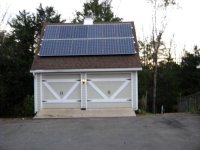Terry1040
Silver Member
:cool2: We installed a wind power tower late in 2015. This replaces the one that my father put in about 30 years ago. That one long ago was blown down by the wind. I know that the cost of solar installs have greatly decreased to the point that solar now is much more cost efficient. We live in an area that our power company has declared solar to be a great choice. On my residence in town, our power company is going to provide an option for homeowners to elect solar power. This means that I might be paying a slightly higher cost, if the solar does not fully self pay, for the large unit that the power company is planning to install. However separately, I intend to add solar for other farm buildings. Part of my motivation is the continual increase in rates from the power companies. I have signed wind power leases on several farms to developers, but that is a very slow process. I would encourage anyone with working solar to respond as to their experience. Also, I would consider others to consider if it might be right for them to reduce their public power dependence by using solar or wind. Happy New Year.
